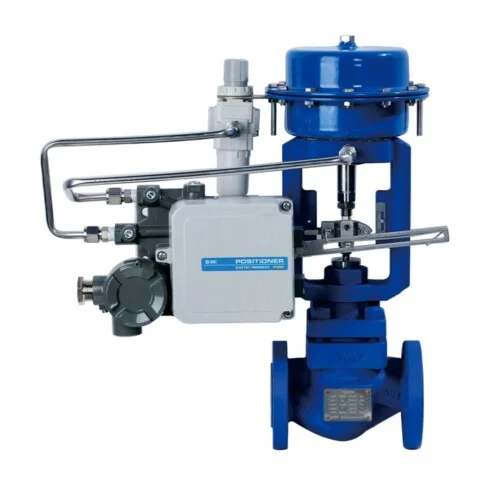Control valves are key equipment in industrial automation processes, consisting of a valve body assembly and an actuator assembly. They precisely control fluid flow through power operation. They come in four major series: single-seat, double-seat, sleeve, and self-operated. Each series offers numerous variations to accommodate diverse operating conditions.
Control valves play an irreplaceable role in numerous industries, including the petroleum, chemical, power, and metallurgy sectors. Based on system commands, they automatically adjust parameters such as pressure, flow, and temperature within pipelines, ensuring stable and efficient production processes, effectively improving product quality and reducing energy consumption. They are crucial for ensuring safe and economical industrial production.

How Control Valves Work
The control unit calculates the control signal required to regulate the fluid based on the system’s setpoints and actual measured parameters (such as pressure, flow, and temperature) and transmits this signal to the control valve.
After receiving the signal, the control valve converts mechanical displacement based on the control signal, changing the control valve’s throttling area. As the throttling area changes, fluid parameters such as flow, pressure, and temperature also change accordingly, allowing the system’s operating state to reach or approach the setpoint, achieving precise control of the industrial process.
Control valve types
Control valves come in a variety of types, and can be categorized into different types. Control valves are classified into the following types based on their structural form:
| Name | Features |
| Straight-through single-seat control valve | There is only one valve core and valve seat, with small leakage, suitable for occasions requiring high sealing performance. |
| Straight-through double-seat control valve | There are two valve cores and valve seats, the unbalanced force is small, a large pressure difference is allowed, and the flow capacity is large. |
| Sleeve control valve | Good stability, low noise, easy maintenance, suitable for high pressure difference and large flow occasions. |
| Angle control valve | The flow path is simple and the resistance is small, which is suitable for media with high viscosity and containing solid particles. |
| Three-way control valve | There are three inlets and outlets to achieve the merging or diversion of media. |
| Diaphragm control valve | The valve body is completely isolated from the medium and is suitable for corrosive, high-viscosity and suspended particle-containing media. |
| Butterfly control valve | Simple structure, small size, light weight and small flow resistance. |
| Ball valve | Quick opening and closing, good sealing performance and large flow capacity. |
| Eccentric rotary control valve | The flow path is simple and the operation is stable. It is suitable for controlling large flow and relatively viscous media. |
In short, there are many types of control valves. Choosing the appropriate type of control valve should be based on specific operating requirements, such as media characteristics, temperature, pressure, flow rate, and control accuracy, to ensure safe, stable, and efficient system operation.
Control Valve Applications
Beyond the common industrial automation field, control valves are also widely used in the automotive and aerospace industries.
Automotive: Steering control valves are primarily used to adjust fluid flow direction to achieve vehicle steering. They maintain a neutral position in the oil circuit during straight-line driving and provide assist by redirecting the oil flow during steering.
Aerospace: In the aerospace field, control valves control aircraft fuel supply, hydraulic systems, and environmental control systems, ensuring safety and proper operation.
Building Automation: In building automation systems, control valves control water and air flow in air conditioning, heating, and ventilation systems, regulating indoor temperature, humidity, and air quality, improving energy efficiency and indoor comfort.
If you haven’t found the right control valve manufacturer, Newton is a good choice. Newton valves undergo comprehensive testing from semi-finished to finished products to meet your quality requirements.

